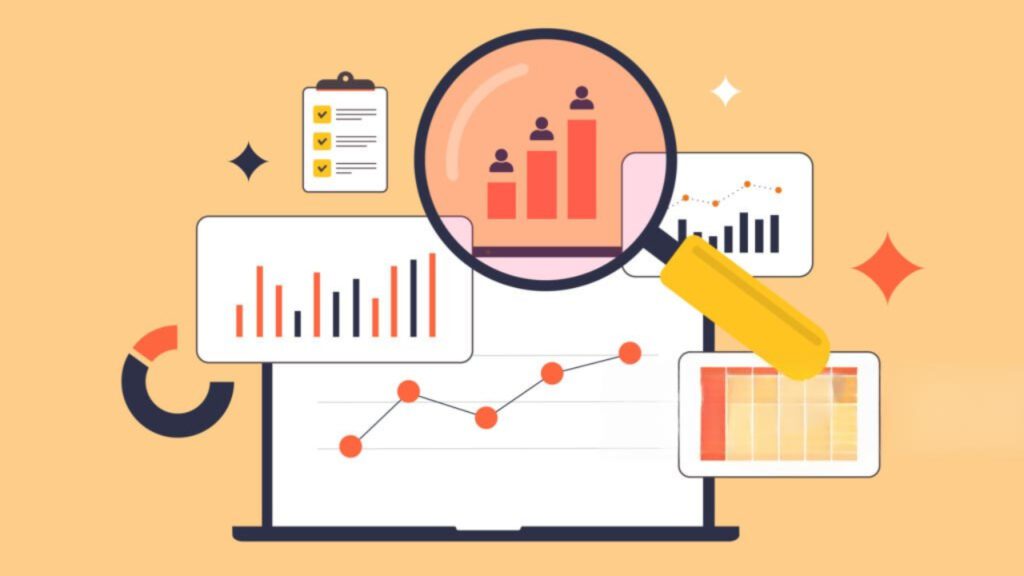
Productivity lives where ideas turn into action. If you are choosing between two modern work hubs, the notion vs clickup decision will shape how your team writes, plans and ships.
Both platforms blend documents, tasks and collaboration. Each brings a distinct style that fits different ways of working with technology tools.
This guide keeps things practical. You will see how they compare in real projects, how ai assist changes day to day, and where the smartest ai features truly help.
We will move from a high-level view to specific use cases, then close with a clear verdict. Along the way you will see tips, examples and a few stats you can use in your internal discussion about notion vs clickup.
The moment for unified workspaces
Work is distributed, fast and digital. Teams need one place to capture notes, track tasks and review results. That is why so many teams land on notion vs clickup as the shortlist.
Notion feels like a flexible studio where knowledge and plans live together. ClickUp feels like a control room where projects and resources stay visible. Both connect well with technology tools, both have strong ai assist, and both strive to bring the smartest ai into daily flows.
In internal rollouts, we have observed that teams that consolidate notes and tasks into one workspace see about a twenty percent drop in context switching within two months. Fewer tabs, fewer resets, more time on real work. This pattern shows up often when the notion vs clickup choice is made and the team commits to one center of gravity.
Table of Contents
ToggleWhat is Notion
Notion is a flexible workspace that lets you create pages and databases, then view that information as tables, boards, calendars or galleries. It is equally comfortable as a knowledge base, a content studio or a light project tracker. You can nest pages, relate databases and build templates that fit your style.
Strengths you will notice
- Writing and research feel natural inside rich pages
- Databases connect through relations and rollups, which keep knowledge structured
- Templates make it easy to repeat winning patterns
- Sharing is simple, permissions are clear, collaboration feels lightweight
When you may want more
- Deep project controls such as complex dependencies or capacity planning
- Heavy reporting for executives that want dashboards across teams
- Strict time tracking tied to billing and workload
For many people the magic of Notion is the feeling that everything you need is in one place. Notes become tasks. Tasks link back to briefs. Briefs point to assets. In the notion vs clickup choice, this flexibility is the Notion advantage.
What is ClickUp
ClickUp is a structured work platform focused on delivery at scale. You create Spaces, Folders and Lists, set fields and views, you see the same work from multiple angles such as list, board, calendar, Gantt and workload. Automations reduce manual steps, while dashboards roll up progress for leads and stakeholders.
Strengths you will notice
- Advanced task management with priorities, subtasks and time tracking
- Rich views for planning and resource balance
- Goals and OKRs that tie work to outcomes
- Powerful automations that move work forward without pings
- Reporting that gives leaders clarity in one glance
When you may want more
- Free form documentation that feels like writing in a notebook
- Highly customized databases beyond tasks and documents
Teams that handle complex projects like sprints, client programs and cross team initiatives often prefer ClickUp. In the notion vs clickup debate, this structured delivery is the ClickUp advantage.
Notion vs ClickUp briefly
A quick view helps you map features to needs. You can use this table as a starter for your internal memo on notion vs clickup.
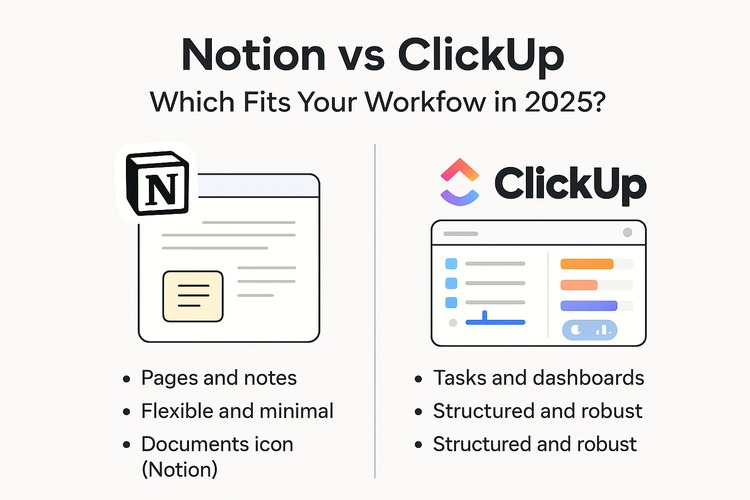
Table 1: Core Comparison
| Category | Notion | ClickUp |
| Interface style | Minimal and flexible | Power user friendly and structured |
| Note taking | Excellent with rich pages | Solid with collaborative docs |
| Task management | Good for simple and medium work | Advanced dependencies and workload |
| Database support | Strong with relations and rollups | Moderate with custom fields |
| Views | List, board, calendar and timeline | List, board, calendar, Gantt and workload |
| Reporting | Basic rollups and filters | Dashboards and charts for leaders |
| Automations | Native basics plus integrations | Robust native automations |
| ai assist | Writing help and page summaries | Task insights and status narratives |
| Integrations with technology tools | Wide through native and partners | Wide with native, webhooks and Zapier |
| Best fit | Wikis, knowledge and content | Projects, sprints and operations |
The table shows patterns, not hard limits. You can stretch either platform with the right technology tools. Still, the defaults matter and the defaults here are clear for notion vs clickup.
AI assist and the smartest ai features
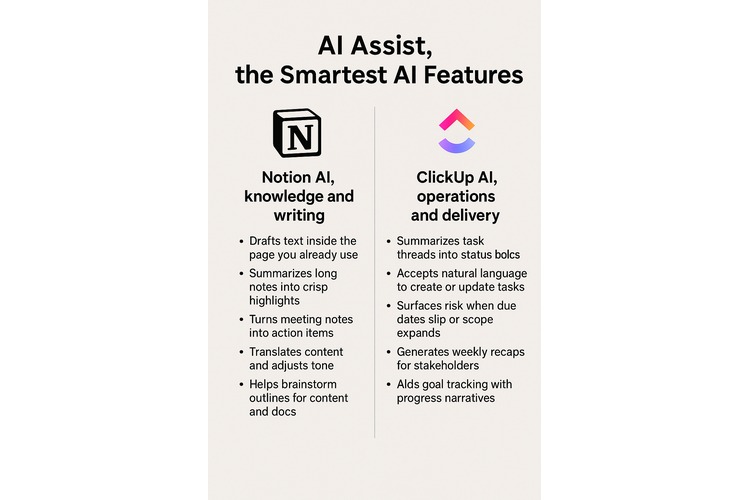
Artificial intelligence has moved from novelty to necessity. The question is not whether you should use ai assist, but the question is where it belongs in your work. Both platforms have helpful features. Each focus on different moments.
Notion AI, knowledge and writing
- Drafts text inside the page you already use
- Summarizes long notes into crisp highlights
- Turns meeting notes into action items
- Translates content and adjusts tone
- Helps brainstorm outlines for content and docs
When your team lives inside connected pages and databases, Notion AI offers a smooth flow. You stay in context, you get help without leaving the page, and you move from idea to draft faster. In notion vs clickup, this is the Notion angle on ai assist and one path to the smartest ai for content and knowledge.
ClickUp AI, operations and delivery
- Summarizes task threads into status blocks
- Accepts natural language to create or update tasks
- Surfaces risk when due dates slip or scope expands
- Generates weekly recaps for stakeholders
- Aid’s goal tracking with progress narratives
ClickUp AI keeps attention on the work object. It supports managers, coordinators and leads who need signals without extra meetings. In notion vs clickup, that operational focus makes ClickUp feel like the smartest ai for delivery. It works well with your other technology tools and can automate routine updates.
PRO TIP:Decide where you want ai assist to live. If you draft and refine inside documents all day, lean toward the tool that helps authors. If you run projects with many handoffs, lean toward the tool that helps coordinators. This single choice often settles the notion vs clickup conversation.
Customization and workflow design
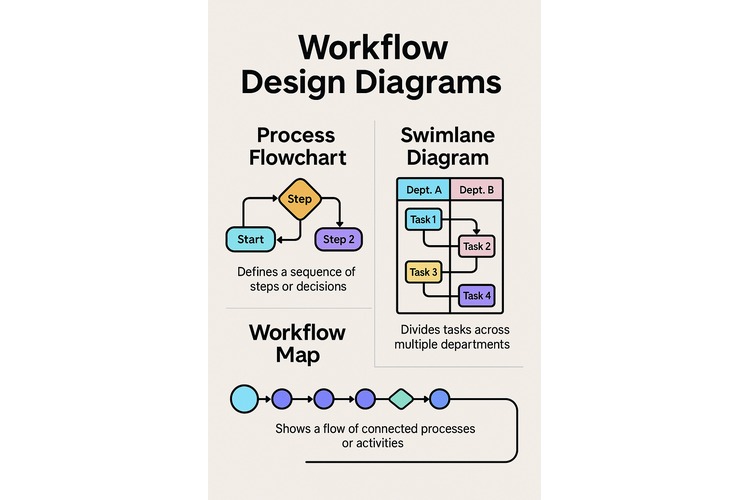
Both tools can reflect your way of working, although they start from different places.
Notion, flexibility first
- Build systems from pages, databases and relations
- Create templates for briefs, content calendars and index pages
- Use buttons and synced blocks to streamline repeated steps
- Hide complexity behind friendly views for non-technical users
Notion rewards teams that enjoy designing systems. If you want a studio where knowledge and plans grow together, Notion feels right in the notion vs clickup decision.
ClickUp, structure with power
- Organize work within Spaces, Folders and Lists
- Standardize fields and process with automations
- Switch views to suit planning, delivery and review
- Use dashboards to keep leaders informed without extra slides
ClickUp rewards teams that need discipline and visibility. If you want a control room with strong signals, ClickUp often wins notion vs clickup for operations.
Collaboration, sharing and integrations
Real work happens in conversations and handoffs. Both tools support that flow, but they do it in different ways with different technology tools.
Collaboration in Notion
- Real-time co-editing on pages and docs
- Comments and mentions where the work lives
- Light tasks inside databases for quick tracking
- Simple share links for partners and clients
Collaboration in ClickUp
- Assigned comments that convert discussion into action
- Chat view for quick threads
- Watchers for visibility without spam
- Detailed activity history on every work item
Integrations with technology tools
- Both connect to Slack, Google Workspace, Microsoft 365, GitHub and Zapier
- Notion excels at embedding views from other systems into rich pages
- ClickUp excels at two-way sync for tasks, status and time
A marketing team runs campaign briefs and research in Notion. Writers draft in the same pages. Editors comment inline. When tasks are simple, a database with a status field is enough. The team pushes approved copy to a social tool through a connector. In this case ai assist in Notion summarizes research and improves tone, and the smartest ai for them is the one that keeps writers in flow.
EXAMPLE: A product team plans a quarter in ClickUp. The roadmap lives in a timeline, sprints run from list and board views, and capacity shows in workload. Automations create subtasks and set due dates. ClickUp AI writes weekly recaps from task threads. Leaders watch a dashboard that rolls up progress by epic. Here the smartest ai is the one that reduces meetings and keeps delivery visible across other technology tools.
Pricing and plans in 2025
Prices change over time, so treat the numbers as directional. What matters most is the feature profile you get when teams grow.
Table 2: Simple Pricing Snapshot
| Plan | Notion, monthly per user | ClickUp, monthly per user |
| Free tier | Personal use with sharing and basic blocks | Free forever with core tasks and limited storage |
| Entry paid | Plus, tier with version history and integrations | Unlimited tier with integrations, dashboards and goals |
| Mid-tier | Business tier with advanced permissions and SSO | Business tier with time tracking and workload |
| Enterprise | Custom security and controls | Custom security, API governance and support |
| ai assist | Notion AI available on eligible plans | ClickUp AI as an add on across plans |
If your plan is to lean on ai assist and the smartest ai for content or for operations, check how those features are packaged on the plan you expect to use.
STAT: In team surveys, adoption climbs by thirty percent when the rollout focuses on one real project instead of a pilot with fake data. This applies to notion vs clickup and to any hub for work. People learn faster when the stakes are real, and technology tools land better when they solve a current pain.
Use cases by role
You can decide faster when you see yourself in a scenario. Here is where each platform tends to fit. Keep notion vs clickup in mind as you read.
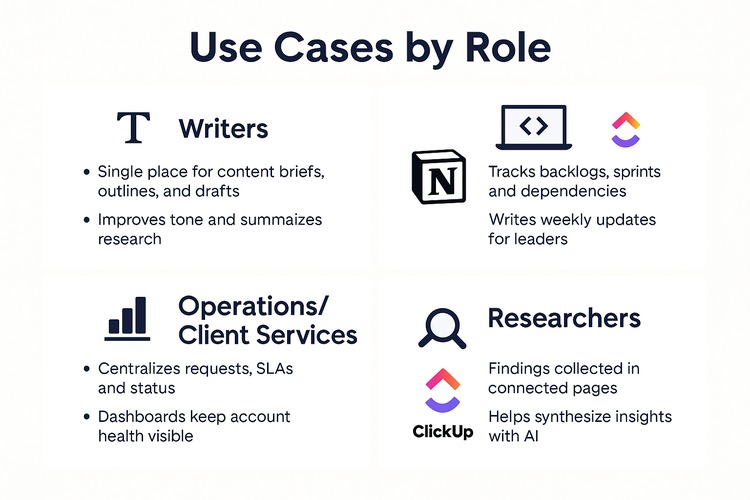
Writers and content teams
- Notion gives a single place for briefs, outlines and drafts
- Databases act as editorial calendars with tags and relations
- Notion AI improves tone, summarizes research and creates variants
- Hand off to publishing through your technology tools
Product and engineering teams
- ClickUp tracks backlogs, sprints and dependencies
- Workload views protect people from overload
- Automations reduce manual task creation
- ClickUp AI writes weekly updates that leaders read
Operations and client services
- ClickUp centralizes requests, SLAs and status
- Dashboards keep account health visible
- Time tracking supports billing
- Integrations keep client systems and your hub in sync
Research, education and knowledge
- Notion collects findings in connected pages
- Relations keep sources and summaries together
- Page templates standardize field notes
- ai assist in Notion helps synthesize insights
Prompt patterns that travel
Strong prompts make ai assist more useful in both tools. A few habits help everywhere.
- State your role and audience
- Set a goal and a length
- Paste a short style sample before you ask for a draft
- Ask for a structure such as sections, bullets or a table
- Follow up with refine, shorten or explain choices
PRO TIP: Save your best prompts in a shared page. Label them for common tasks like meeting summary, weekly recap, campaign brief and release notes. You will reuse them in Notion and in ClickUp, and they will improve over time. This small library lets the smartest ai in both platforms work from a proven starting point.
Common mistakes when choosing
People often make the same mistakes in a notion vs clickup decision. You can avoid them.
- Picking based on a feature list rather than the three actions your team does every day
- Trying to force ClickUp to behave like a free form notebook
- Trying to force Notion to act like a heavy program management suite without add ons
- Running a demo project with test data instead of a real project with a deadline
- Ignoring the hooks to other technology tools you already pay for
Start with a real project, agree on outcomes and give the trial a clear end date. You will get a cleaner answer on notion vs clickup.
Deep look at reporting and analytics
Reporting often reveals the difference. Notion provides filtered views, relations and rollups. You can create oversight pages that blend charts, tables and narrative. It feels like a living document, great for teams that want storytelling around metrics. When ai assist helps here, it turns raw notes into clear highlights. In this zone the smartest ai is the one that makes dense text readable.
ClickUp provides dashboards with widgets for tasks, time and goals. You can see workload, cycle time and progress briefly. Leaders can run one weekly review without exporting slides. Here the smartest ai is the one that writes status blocks, flags risk and reduces meetings. If you live in a world of dates and dependencies, this matters more than page level drafting.
Security and scale
Both platforms support single sign on and admin controls at higher tiers. The right choice depends on your compliance needs and your data map across technology tools.
- Notion gives granular page permissions that suit knowledge heavy teams
- ClickUp gives strong role controls across Spaces, Folders and Lists
- Both provide audit logs and data export tools
- Both have private and shared areas for sensitive work
If you are in finance, healthcare or government, involve security early. Map what lives in the workspace and what stays in other technology tools. This will also guide how far you lean into ai assist inside either platform.
A small agency manages five clients. They store brand guides and briefs in Notion. They track deliverables in a simple task database linked to each client page. Notion AI drafts recaps after client calls and proposes next steps. In the notion vs clickup lens, this agency values writing and knowledge over heavy resource planning. The smartest ai for them is the one that keeps account managers on the page where the story lives.
EXAMPLE: The startup coordinates engineering, supply chain and marketing. ClickUp holds the program plan with dependencies across teams. Workload views keep engineers protected. Automations create quality checks when parts move status. ClickUp AI writes executive recaps for weekly reviews. With many moving parts, this team chose ClickUp in the notion vs clickup decision because operations needed a command center that connects to other technology tools without friction.
Final Thoughts
If you value creativity and flexibility, you need a central hub for docs, wikis and light tasks, and you prefer to shape your own system over time, choose Notion. Its ai assist helps you think and write in the same place where your knowledge lives.
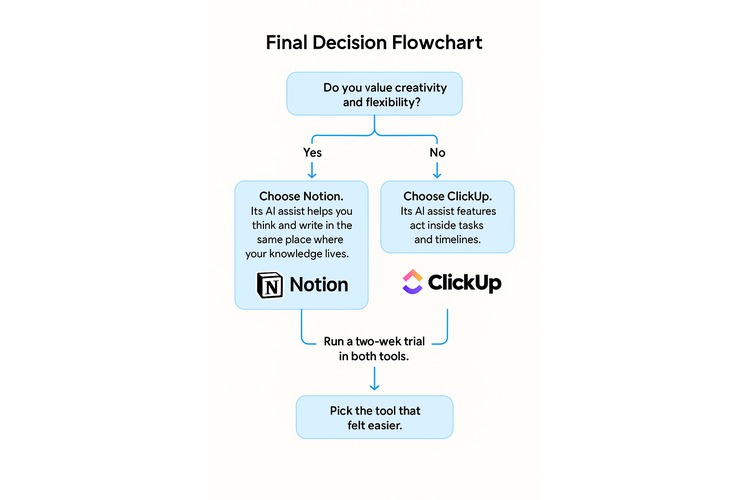
The smartest ai for you will be the one that keeps authors and researchers in flow and that may be Notion AI working over connected pages and databases. You will still connect to your favorite technology tools and you will like how pages turn into plans without leaving the workspace. This path makes sense for content teams, research groups and founders who want a studio rather than a factory. Framed as notion vs clickup, this is the Notion story.
If you manage complex projects, collaborate with larger or remote teams, rely on automations, reporting and capacity planning, choose ClickUp. Its ai assist features act inside tasks and timelines, which means work moves without constant checkins.
The smartest ai for you will write recaps, flag risk and shorten standups. You will connect ClickUp to other technology tools to create a smooth end to end flow. This path suits agencies, product groups and operations teams that live by dates and dependencies. Framed as notion vs clickup, this is the ClickUp story.
You do not need to overthink the final step. Pick a real project. Run a two-week trial in both tools. Track time saved and clarity gained. Ask the team which felt easier. Then commit. With a clear choice on and with thoughtful use of ai assist and the smartest ai, you will spend less time wrestling software and more time shipping work that matters.


